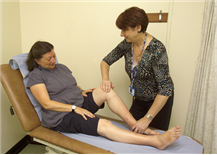Clinical trials
Research area

Introduction
We have a track record of community-based clinical trials in knee osteoarthritis, and currently are developing trials that aim to help target treatments to those most likely to benefit, and to improve pain outcomes by enhancing the contexts through which treatments are delivered. We also are investigating risk factors, including genetic risk factors, for the development and persistence of arthritis pain.
Research area
Clinical trials
We focus on randomised controlled trials (RCTs) of treatments for knee pain and osteoarthritis (OA) largely because of their high prevalence, the marked disability that may associate with knee OA, and the accessibility of the knee for detailed assessment (including clinical, imaging, synovial fluid analysis). We have recruited participants directly from the community to reduce selection bias and improve generalisability of our findings. Many of our trials have been relatively long-term (up to two years) and have included both non-pharmacological and drug treatments. A recent example of such a study conducted by our group was a Versus Arthritis funded RCT that examined the efficacy and cost effectiveness of dietary intervention, with or without home-based exercise, in community-derived overweight and obese people with knee pain and OA with observations over a two year period.
Currently we are developing two RCTs involving participants with symptomatic knee OA. The first will determine the efficacy of a short intervention that addresses contextual factors to optimise analgesic efficacy of a newly prescribed topical non-steroidal anti-inflammatory agent. This will allow us to better understand the role of context in mediating efficacy of a pharmacological agent, and to develop enhanced contexts that can improve benefits from existing treatments. The second placebo-controlled RCT will investigate factors, including knee inflammation assessed by imaging, that may predict response to either oral paracetamol or an oral non-steroidal anti-inflammatory drug (NSAID). By better understanding the mechanisms by which treatments may help some patients with OA pain more than others, we will be better able to develop new treatments and help people choose those treatments from which they are most likely to benefit.
We are also conducting an NIHR/RfPB-funded single blind feasibility RCT – the Home-Administered Pre-surgical Psychological Intervention for Knee Osteoarthritis (HAPPiKNEES) trial. Knee replacement surgery reduces pain for many people with osteoarthritis (OA). However, surgical outcomes are partly dependent on patients’ mood, and those with depression or anxiety have worse outcomes. The aim of the HAPPiKNEES trial is to evaluate the acceptability of a short-term psychological intervention based on cognitive behavioural therapy (CBT) in improving outcomes following arthroplasty knee surgery for people with knee OA. Potential participants are recruited from the knee surgery pathway at Nottingham University Hospitals NHS Trust and Sherwood Forrest Hospitals NHS Foundation Trust. If found feasible, this trial will form the basis for a fully powered RCT that will evaluate the clinical and cost-effectiveness of this intervention in improving patient outcomes following arthroplasty knee surgery.
[Back to top]